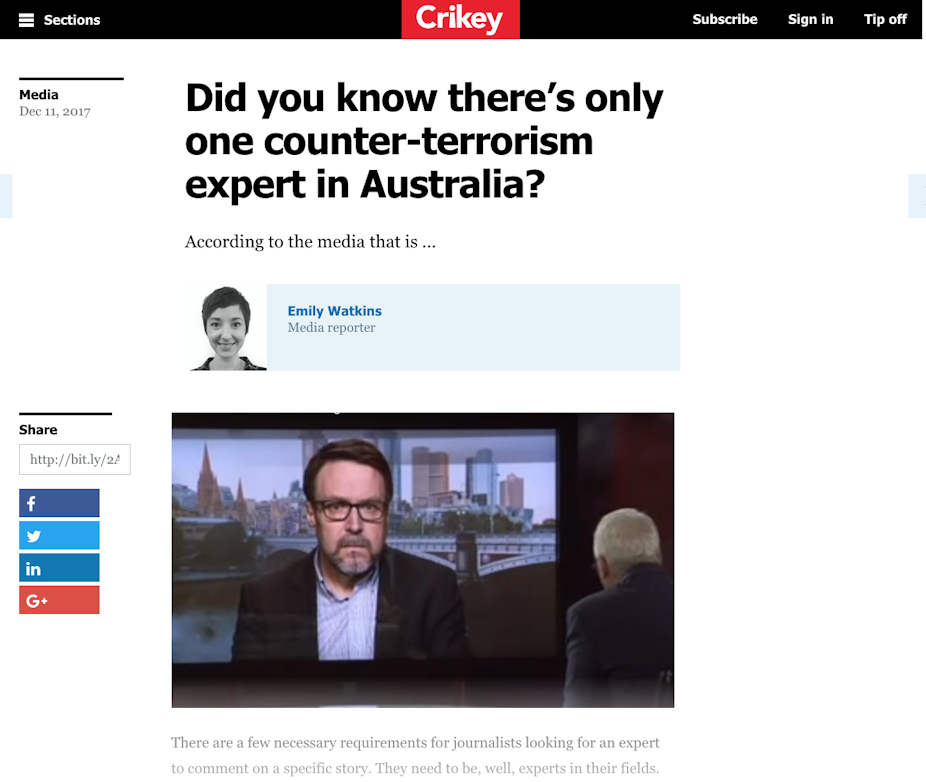Journalists are often under deadline pressure, which is why, says Crikey’s Emily Watkins, they return again and again to the same experts. Those who give good quotes are often also pretty good at making themselves available. The end result is it looks like there’s only one counter-terrorism expert in town, or one constitutional lawyer, or one demographer.
But in every field there is more than one expert, and not all of them are camera or radio shy. In the last 12 months at The Conversation we published 1,800 new writers, all experts in their given field. Most go on to do radio interviews and sometimes TV spots. Some even become the go-to expert in their field.
So for journalists and readers looking for a little more diversity and depth, here are some alternatives to Crikey’s list of speed-dial experts.

Counter-terrorism
The expert most journos go to: Greg Barton
Alternatives: Adrian Cherney, UQ; Kieran Hardy, Griffith University
If you haven’t read Professor Greg Barton’s essay For The Conversation on the rise of Islamic State, you really should.
But there are many other terrific counter-terrorism experts. Two are University of Queensland Associate Professor Adrian Cherney, and Griffith University Lecturer Kieran Hardy.
Cherney is especially perceptive on the causes of extremism and terrorism that aren’t about blaming Islam.
And if you’ve ever wondered why some acts of violence are classified as terrorism but other aren’t, Hardy is your man.

Constitutional law
The expert most journos go to: Anne Twomey
Alternatives: Gabrielle Appleby, UNSW; Brendan Gogarty, UTAS
The citizenship crisis meant 2017 was a good year for constitutional lawyers. But of the dozens of articles Professor Anne Twomey has written for The Conversation, the one on whether Queensland Premier Campbell Newman could still be premier if he lost his seat remains the most poplar, proving it’s not just federal law Twomey is good at explaining.
There are also plenty of others with deep expertise in constitutional law.
Associate Professor Gabrielle Appleby is strong on the constitutional issues of Aboriginal recognition.
Dr Brendan Gogarty is also a constitutional law expert, and he’s particularly good on technology law and international law. One of his most popular pieces for The Conversation this year, was this one on how technology has left the law behind in the case of drones and backyard skinny dippers.
Demography
The expert most journos go to: Bernard Salt
Alternative: Liz Allen, ANU

We love your work Bernard, but we still haven’t forgiven you for that smashed avocado trope.
Dr Liz Allen hasn’t invented a meme (as far as we know), but she has written some of The Conversation’s most popular data-driven articles, including this one on how to work out whether you are in Australia’s middle class.

Astronomy
The expert most journos go to: Alan Duffy
Alternatives: Jonti Horner, USQ; Tanya Hill, Museums Victoria
Stargazing is a popular pastime, and there are few astronomers who can talk science as eloquently as Associate Professor Alan Duffy.
But with a new exo-planet being discovered almost every week this year, we’ve needed more than one astronomer to help break it down. Senior Research Fellow Jonti Horner is one such expert.
Horner, along with his USQ colleagues Jake Clark, Belinda Nicholson, and Brad Carter recently explained why stars twinkle for a curious 3 year-old kid, proving academics can get through to even the youngest of audiences.
For the night sky observations and space probe exploration Honorary Fellow Tanya Hill, who is the astronomy curator at the Melbourne Planetarium, is worth adding to your speed dial.

Gender politics, feminism and pop culture
The expert most journos go to: Lauren Rosewarne
Alternatives: Michelle Smith, Monash University; Catherine Strong, RMIT
Lauren has a huge base of loyal readers here at The Conversation. And in case you missed it last year, she wrote the definitive guide to Christmas films.
This year’s #metoo movement has encouragingly seen more women find their voice in the media, and journalists seek out more diversity.
Senior Lecturer Michelle Smith has penned some of our most well-read articles on attitudes to women, including this one on our double standards on older women and beauty.
And before the Harvey Weinstein scandal broke, Senior Lecturer Catherine Strong got us all thinking with this discussion of Chuck Berry and why iconic musicians, particularly after death, have their abuse of women ignored or excused.

Government budget analysis
The expert most journos go to: Chris Richardson
Alternative: Richard Holden, UNSW
Trust us, if other economists spent as much time in the Canberra press gallery as Chris Richardson they’d be on telly a lot more too.
One economist who can also think on his feet is Professor Richard Holden, who joins The Conversation in the budget lockup each year and writes our weekly economics wrap, Vital Signs.
He’s also not afraid to talk housing bubble (and our banks’ exposure to mortgage risk) – given it’s the topic on the lips of most Australians thinking about their fortunes in the year ahead.

Adolescent psychology
The expert most journos go to:: Michael Carr-Gregg
Alternatives: Jo Robinson, University of Melbourne; Joanne Orlando, Western Sydney University
Michael Carr-Gregg has written several books on parenting, so it’s understandable he’s a hot commodity on breakfast television.
One alternative is Dr Jo Robinson, Senior Research Fellow at Orygen, the National Centre of Excellence in Youth Mental Health at the University of Melbourne. Robinson is doing interesting research on the role of the internet in suicide prevention.
And if you’re interested in that perennial parenting issue of how much technology is too much for kids, Joanne Orlando can help.
This list is just a small sample, and you can find thousands of other experts by searching for the subject you’re interested in via The Conversation’s search bar, or in our research and expert database. Many of them also provide their contact details on our site, but if you can’t find them, get in touch with editors@theconversation.com.au or call 0423 156 062.

